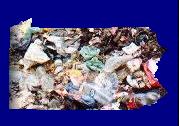|
debitage: OSP Archive | |||||
|
Material originally published on Open Source Politics OSP Archive > "Royce Lamberth has made his decision. Now let him enforce it."> The Garbage Cans Of Pennsylvania > An Endangered Act > Dean Vs. Deanism > Bush Is Gone -- Now What? > Shameless Specter > Fighting Blind > Activist Administrators > No Thanks, We'll Walk > Affordable National Service > The Donor On The Street > In Defense Of "Climate Change" > McCain: Honorable Opponent, Bad VP > Ronald Regan -- The Man, The Myth, The Eulogy > Lessons Of Mussolini > Optimism At All Costs > New Roads, Old Rhetoric > When $175,000 Just Isn't Enough > Pennsylvania Spoilers > Keyes Vs. God > Debate Posturing > Poetic Justice As Fairness > Dog Bites Man
 This work is licensed under a Creative Commons Attribution-NonCommercial-ShareAlike 2.5 License. |
The Garbage Cans of Pennsylvania 18 December, 2003
Pennsylvania took in 11.7 million tons of trash last year, more than double the intake of second-place Virginia. Located conveniently close to the major urban centers of the east coast -- especially New York City -- rural Pennsylvania makes for an appealing place to throw the huge volumes of garbage generated each day by urban businesses and households. The refuse that comes into Pennsylvania is more than just candy wrappers and baby diapers. There are also industrial waste products such as fly ash, along with soil from dredging projects and contaminated site cleanups. The state's history of mining has left it with lots of holes, and this development has fostered a large mushroom-growing business and has offered a convenient place to dump waste. Now, Pennsylvania has lots of open space, but it's no Wyoming. Wherever you dump, chances are it is near someone's home -- and that someone likely won't be too pleased about it. But as it now stands, there is little that they can do about it: Federal control of interstate commerce limits the power of the state to block waste imports. This is not necessarily a bad thing -- the people of upstate New York don't deserve Manhattan's trash any more than the people of Pennsylvania do, and using a landfill closer to home does cut down on gas usage. Within the state, the authority to approve waste disposal rests largely with the Department of Environmental Protection (DEP), not with the communities directly affected. For example, current law prohibits communities from enforcing stricter standards for waste disposal than the state minimum. A recent case before the state Supreme Court did everything but clarify the issue. Three justices ruled that a township could bar the dumping of sewage sludge, three ruled that it couldn't, and one decided that the plaintiff, the New Jersey company whose dumping plans were stifled, shouldn't have been allowed to sue. Last month, state Rep. David G. Argall introduced a bill, co-sponsored by Rep. Keith McCall of a neighboring district, that would grant communities more authority. He was motivated to do so by the agitations of people in the towns of Tamaqua, Coaldale, and Summit Hill, who have been fighting against a dumping operation going on in the nearby Springdale Pit. The Tamaqua Borough Council reached an agreement with Lehigh Coal and Navigation to dump river dredgings and fly ash, a move that recently ousted council member Micah Gursky says was the best the panel could do given the town's legal powerlessness. Residents were not happy with the dumping operation, which left gray dust all over town and raised the specter of health problems despite reassurances from the DEP. Dr. Dante Picciano formed a citizens' group called Army for a Clean Environment (ACE), citing high contaminant levels in Hudson River sludge and environmental problems at a nearby test site for the disposal technology being used in the Springdale Pit. The work of ACE's 700 members enabled local officials to increase pressure on the state to do something about the waste-disposal industry. And an October rally in Harrisburg helped draw attention to the issue. Beyond Argall's bill, other progress toward reducing Pennsylvania's waste intake is on the horizon. Gov. Ed Rendell opposes dumping out-of-state waste in Pennsylvania. He advocates raising tipping fees, which would make the state a less desirable place to dispose of trash. And earlier this month, the DEP closed the long upopular Pottstown landfill, framing the decision as a taste of things to come. But while keeping trash out of Pennsylvania will be good for the residents of the Keystone State, the situation isn't really improved if the waste is just taken elsewhere. Hopefully the increased cost of disposal will motivate waste producers to find new methods for dealing with garbage rather than just focusing new places to stick it. New York City is looking for alternatives to shipping its waste to Pennsylvania, a practice that was supposed to be temporary when it was instituted in 1997. What we really need is a concerted effort to reduce the amount of waste Americans produce. More reusable, recyclable, and biodegradable products need to replace our current proliferation of disposable packaging. Stricter pollution standards are necessary to prevent contaminated wastes from being produced. And we need to replace our cultural conception of the trash can as a black hole. It is time for folks to realize that whatever we throw away winds up in someone else's backyard. Stentor Danielson |
||||
 Here's one fact you won't find Pennsylvania's tourism brochures bragging about: The Keystone State is the nation's leading importer of trash.
Here's one fact you won't find Pennsylvania's tourism brochures bragging about: The Keystone State is the nation's leading importer of trash.